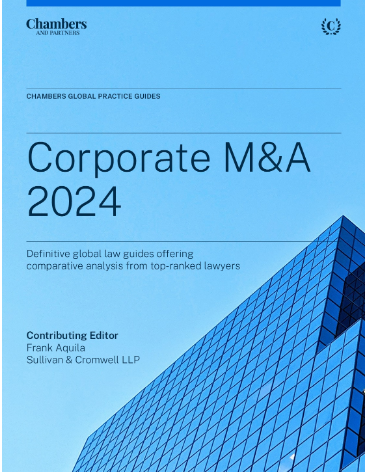
SkyLaw’s Annual M&A Guide Published in Chambers
May 10, 2024
Confidence is returning to the M&A market in Canada and deals are getting done

Legal publisher Chambers and Partners has published the 2024 edition of its Corporate M&A Global Practice Guide. We are pleased to be the exclusive author of the Canadian M&A section of this guide for the fourth year running. We have also provided two Expert Focus articles on the increasing use of earn-outs and recent changes to the foreign investment review regime in Canada.
SkyLaw’s full articles on Corporate M&A can be found below or at the following links:
● Law and Practice in Canada
● Trends and Developments in Canada

This year’s comprehensive guide covers 70+ jurisdictions and provides the latest legal information on acquiring a company, antitrust regulations, restrictions on foreign investments, stakebuilding, conditions for a takeover offer, defensive measures, squeeze-out mechanisms, duties of directors, and shareholder activism. The “Compare locations” tab allows for a comparison of selected topics by jurisdiction.
The entire guide is available to view online here at no charge, and the eGuide is available to view or download here.
Our View on M&A in Canada
 Canada is a land of opportunity for individuals and businesses alike. Our M&A market is resilient in large part due to the quality, diversity, and innovation of Canadian firms and entrepreneurs.
Canada is a land of opportunity for individuals and businesses alike. Our M&A market is resilient in large part due to the quality, diversity, and innovation of Canadian firms and entrepreneurs.
Some headwinds persist: the cost of capital, evolving geopolitical policy, and some recent changes to the Investment Canada Act are expected to add complexity to deal planning.
However, with a historic transfer of wealth on the horizon as founders plan their exits, and with private equity firms and pension plans executing long-awaited plans to deploy capital or exit their portfolio companies, Canada is seeing an increase in M&A activity and will continue to be a place where great deals are done.
Below is an excerpt from our Trends and Developments article. Click through here to see the full article.
What Should Potential Acquirors Consider in 2024?
- Soaring inflation and rising interest rates made companies whose profits lie in the distant future look less attractive, pushing down valuations and slowing the rate of investment, particularly in tech companies and start-ups. With the surge in stock market valuations and the expectation that interest rates are likely to fall (or, at least, will not rise further), the valuation gap between buyers and sellers is likely to shrink.
- The importance of planning and assessing risk will continue to be a focus in corporate transactions. Buyers are expected to continue to proceed cautiously, with longer and more complex pre-announcement steps being taken as compared to the heady days of 2021.
- Who bears the risk of a pandemic or war? The relevant transaction document should make clear how the risk of a future shock should be allocated. Canadian courts have generally found that buyers cannot escape their obligations by pointing to the impact of COVID-19 on the target business, but in each case, it turns on the language used in the purchase agreement.
- Foreign acquirors need to carefully consider the recent changes to the Investment Canada Act and determine whether the new voluntary pre-closing filing mechanism should be used. The March 2024 amendments to the Investment Canada Act could significantly impact the timetable for closing an acquisition of a prescribed business. The expanded scope of the national security provisions could impact a greater number of transactions.
- Recent changes to the taxation of capital gains may add uncertainty and increased complexity.
- Earn-out provisions continue to grow in popularity to bridge the valuation gap and mitigate against the economic risks post-closing.
- Parties should take time to perform detailed due diligence on counterparties to ensure compliance with the evolving list of sanctions and anti-money laundering legislation.
- Canada’s move to “friend-shoring” will impact acquisitions and trade. Many Canadian businesses are dependent on cross-border trade. Rising protectionism in the United States and other trading parties, exacerbated by geopolitical tensions, can limit the growth potential of Canadian businesses. There may be greater political risk to transactions in politically sensitive industries.
- Insolvencies are expected to continue to rise, making buyers more cautious but also creating an opportunity to acquire attractive distressed assets.
- Canadian businesses are increasingly restructuring under the arrangement provisions of corporate statutes instead of the traditional insolvency proceedings, providing more flexibility to recapitalise at an earlier stage in the process.
SkyLaw’s Full Articles from the Global Practice Guide
This blog post is not legal or financial advice. It is a blog which is made available by SkyLaw for informational purposes and should not be used as a substitute for professional advice from a lawyer.
This blog is subject to copyright and may not be reproduced without our permission. If you have any questions or would like further information, please contact us. We would be delighted to speak with you.
© SkyLaw . All rights reserved. SkyLaw is a registered trademark of SkyLaw Professional Corporation.